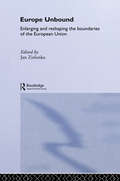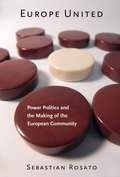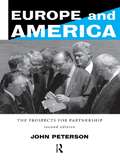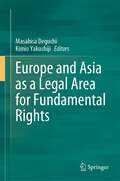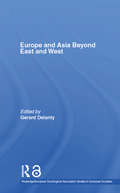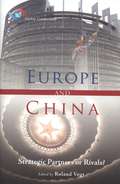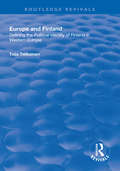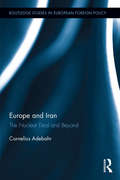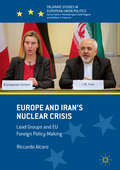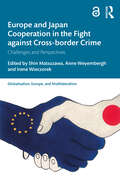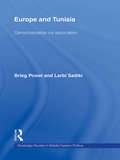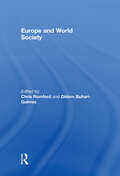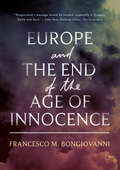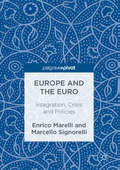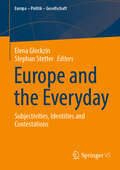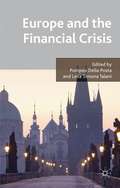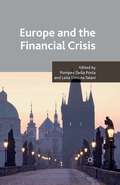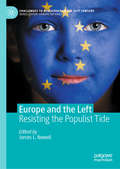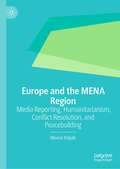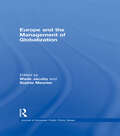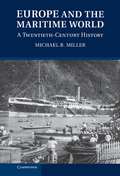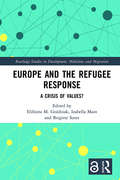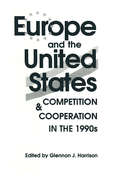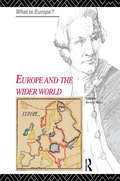- Table View
- List View
Europe Unbound: Enlarging and Reshaping the Boundaries of the European Union (Routledge Advances in European Politics)
by Jan ZielonkaEurope Unbound provides an analysis of the enlargement of the European Union and examines from both a theoretical and a political approach issues such as:* Where does Europe end?* Should Europe's borders be open or closed?* How does the evolution of territorial politics impact on the course of European integration?This book draws upon such diverse fields as History, Sociology, Political Science and International Relations and contains contributions from an international range of respected academics.
Europe United: Power Politics and the Making of the European Community (Cornell Studies in Security Affairs)
by Sebastian RosatoThe construction of the European Community (EC) has widely been understood as the product of either economic self-interest or dissatisfaction with the nation-state system. In Europe United, Sebastian Rosato challenges these conventional explanations, arguing that the Community came into being because of balance of power concerns. France and the Federal Republic of Germany—the two key protagonists in the story—established the EC at the height of the cold war as a means to balance against the Soviet Union and one another.More generally, Rosato argues that international institutions, whether military or economic, largely reflect the balance of power. In his view, states establish institutions in order to maintain or increase their share of world power, and the shape of those institutions reflects the wishes of their most powerful members. Rosato applies this balance of power theory of cooperation to several other cooperative ventures since 1789, including various alliances and trade pacts, the unifications of Italy and Germany, and the founding of the United States. Rosato concludes by arguing that the demise of the Soviet Union has deprived the EC of its fundamental purpose. As a result, further moves toward political and military integration are improbable, and the economic community is likely to unravel to the point where it becomes a shadow of its former self.
Europe and America: The Prospects for Partnership
by John PetersonThe conflict in Bosnia, disputes within the new World Trade Organizatiion and debates about NATO enlargement all illustrate a single point: no relationship is more important in determining the state of international relations than the alliance between Europe and America. Contrary to accepted wisdom, John Peterson argues that the end of the Cold War actually enhances the prospects for partnership between the United States and the European Union. Completely updated, this book offers a clear and penetrating analysis of the problems and opportunities facing the transatlantic alliance.
Europe and Asia as a Legal Area for Fundamental Rights
by Masahisa Deguchi Kimio YakushijiThis book explores the possibility of an Asian legal sphere based on the model of Europe. It features articles written by leading experts from Europe and Asia. After centuries of violent conflicts, Europe began a process of integration which leads to 75 years of peace and a community with the common values of freedom, fundamental rights, and the rule of law. But the circumstances that lead to the unification of Europe differ from current-day Asia: Besides the huge economic gaps between neighboring countries and a wide variety of political forms of government, Asia also does not share the unifying narrative of post-WWII Europe.From an economic point of view, Asia is a highly developed region; despite the differences between the political systems, the region has grown together—economically and in recent times also politically. However, the legal systems of the respective countries have not created the necessary conditions for a peaceful coexistence. Can Europe be a model for Asia? Based on the history and development of the European unification process, this book asks the question to what extent Asia can look to Europe as a model and what lessons can be learned.
Europe and Asia beyond East and West (Studies in European Sociology)
by Gerard DelantyThis major new book tackles key questions on Europe in the context of shifting parameters of East and West. The contributors - sociologists, anthropologists, philosophers and historians - show, from a variety of different perspectives, that the conventional equation of Europe with the West must be questioned. Featuring four thematically organized chapters, the book looks at: a post-Western world Asia in Europe: encounters in history between Europe and Asia otherness in Europe and Asia. Exploring new expressions of European self-understanding in a way that challenges recent ideological notions of the ‘clash of civilizations’, this outstanding work draws on recent scholarship that shows how Europe and Asia were mutually linked in history and in contemporary perspective. It argues that as a result of current developments and the changing geopolitical context, both Europe and Asia have much in common and that it is possible to speak of cosmopolitan links rather than clashes. This book will be of great value to students and researchers in the fields of sociology, European politics and history and cultural theory.
Europe and China
by Roland VogtCasting new light on Sino-European relations, this volume challenges the official rhetoric of "constructive engagement" and "strategic partnership" between Europe and China, by revealing the internal and external limitations and constraints of their interaction. The contributions illustrate that Europe and China are not static, monolithic, and unitary entities. Sino-European relations are becoming a complex web of economic, diplomatic, social, and cultural interlinkages and are driven by numerous actors with often diverging interests. While trade has been a dominant factor in this relationship, Europe and China are now tied together by more than commercial exchanges. Concerns about energy and climate change, human rights and policies towards Africa, geostrategic considerations, as well as a pervasive anxiety about China's rise in Europe are now important elements of this relationship. In the absence of common borders or strategic interests in each other's regions, Sino-European affairs are cordial and friendly, but also remain distant and vague. The growing quantity of interactions has so far not led to a qualitative upgrade of the relationship. Both sides continue to be secondary partners to each other. Misperceptions, false expectations, and a general lack of understanding of each other's internal drivers of policy continue to be major obstacles for improving ties between Europe and China.
Europe and Empire: On the Political Forms of Globalization (Commonalities)
by Massimo CacciariThe European Union and the single currency have given Europe more stability than it has known in the past thousand years, yet Europe seems to be in perpetual crisis about its global role. The many European empires are now reduced to a multiplicity of ethnicities, traditions, and civilizations. Europe will never be One, but to survive as a union it will have to become a federation of “islands” both distinct and connected.Though drawing on philosophers of Europe’s past, Cacciari calls not to resist Europe’s sunset but to embrace it. Europe will have to open up to the possibility that in few generations new exiles and an unpredictable cultural hybridism will again change all we know about the European legacy. Though scarcely alive in today’s politics, the political unity of Europe is still a necessity, however impossible it seems to achieve.
Europe and Finland: Defining the Political Identity of Finland in Western Europe (Routledge Revivals)
by Teija TiilikainenFirst published in 1998, this volume asked the question, what is Europe?. What is Finland’s position in Europe?. The author tries to give an answer to these questions by defining first Europe in terms of its key political traditions and then locating Finland into this map of historical ideas. The ultimate purpose of this analysis of historical ideas is very pragmatic as it tries to find an answer to the core problems of European unification. Why are different European countries at differing levels of readiness as far as the project of unification is concerned?. The answer can be found again in political traditions.
Europe and Iran: The Nuclear Deal and Beyond
by Cornelius AdebahrThe EU’s approach to Iran has emerged as one of the few successes of European foreign policy. Still, its role in international negotiations from 2003, as much as its broader approach to Iran, are generally poorly appreciated by policy-makers in Europe, the United States, and around the world. This book aims to explain the specifics of the EU’s approach to Iran, taking into account both the complexity of European foreign policy, in particular within transatlantic relations, and Iran’s (aspired) place in the international order. It informs the reader about the special negotiation format that included a number of world powers as well as multilateral bodies such as the International Atomic Energy Agency (IAEA) and the UN Security Council. Furthermore, it provides an outlook on European post-nuclear deal strategies and offers conclusions on the effectiveness of Europe’s multilateral approach to foreign policy. By looking at the EU’s diplomatic activities towards Iran over more than a decade, the book focuses on Europe’s actorness in international politics. This text will be of key interest to scholars, students and practitioners involved or interested in the European Union, Iran, U.S. foreign policy as well as Foreign and Security policy, including sanctions policy, and more broadly to European Politics, Middle East studies and international relations.
Europe and Iran’s Nuclear Crisis: Lead Groups And Eu Foreign Policy-making (Palgrave Studies in European Union Politics)
by Riccardo AlcaroThis book investigates the European involvement in managing the nuclear dispute with Iran, shedding new light on EU foreign policy-making. The author focuses on the peculiar format through which the EU managed Iran’s nuclear issue: a ‘lead group’ consisting of France, Germany and the UK and the High Representative for EU foreign policy (E3/EU). The experience of the E3/EU lends credibility to the claim that lead groups give EU foreign policy direction and substance. The E3/EU set up a negotiating framework that worked as a de-escalating tool, a catalyst for Security Council unity and a forum for crisis management. They inflicted pain on Iran by adopting a comprehensive sanctions regime, but did so only having secured US commitment to a diplomatic solution. Once the deal was reached, they defended it vigorously. The E3/EU may have been supporting actors, but their achievements were real.
Europe and Japan Cooperation in the Fight against Cross-border Crime: Challenges and Perspectives (Globalisation, Europe, and Multilateralism)
by Shin Matsuzawa, Anne Weyembergh and Irene WieczorekThis book is the first to map and critically analyse the legalisation of EU-Japan cooperation in criminal justice matters, charting the existing legal instruments which regulate cooperation in the fight against crime between European states and Japan. It examines which forms of cooperation are regulated by EU Law, and which are not, and takes stock through selected case studies of the functioning in practice of cooperation between the EU as an organisation, single European States and Japan. The book focuses particularly on police cooperation, exchange of electronic evidence, mutual legal assistance, extradition, transfer of prisoners and data exchanges. It looks at the EU-Japan MLA Agreement, the Europol-Japan National Police Agency Working Arrangement, the negotiations on a PNR Agreement, and the Council of Europe Convention for Transfer of Sentenced Persons; all instruments aimed at regulating cooperation against crime between European states and Japan. Finally, the book also looks at the implications for the fight against crime of the EU-Japan Economic Partnership Agreement, Strategic Partnership Agreement, and the European Commission Adequacy decision. This book will be of key interest to scholars and students of EU Criminal law, EU-Japan cooperation, Japanese studies, transnational crime, and more broadly to comparative criminal justice, International Relations and security studies.
Europe and Tunisia: Democratization via Association (Routledge Studies in Middle Eastern Politics)
by Larbi Sadiki Brieg PowelThis book is concerned with EU democracy promotion inside Tunisia, the first Arab signatory of an Association Agreement with the EU. Focusing on the content, context, mechanisms, and outcomes of democratization via association, the authors examine whether Tunisia’s specific mode of democratization works in tandem with EU democracy promotion objectives, and the extent to which both adapt association in a way that neither sabotages EU democracy promotion nor undermines Tunisia’s specificity. Drawing on Arabic, English and French sources, the book deploys a variety of methods and disciplinary approaches - discourse analysis, interviews, democratization theory, foreign policy analysis, security studies, political history, nationalism and identity – and takes an interpretivist perspective, conceiving of political processes as fluid and tentative. The first comprehensive study of the effects of the Union’s Mediterranean democracy promotion strategy on a single recipient state, this book will be relevant to students of Middle East politics, European foreign policy, Euro-Mediterranean studies, democratization theory, and Euro-Arab relations, this book will also be of great interest to researchers, academics and policy-makers.
Europe and World Society
by Chris Rumford and Didem Buhari-GulmezEurope and World Society offers a distinctive critical approach to understanding European transformations, exploring both the progress and limitations of integration on various key policy areas such as agricultural policy, education reform, migration, and external relations, as well as the relationship between European regionalism and globalization. Due to its innovative theoretical framework, based on macro perspectives including ‘World Polity Theory’, developed by Stanford sociologist John W. Meyer, this collection contributes to both the recent ‘sociological turn’ in European studies, and to the constructivist critiques of rational choice accounts of modern Europe. At a time when the European integration project has been severely challenged by multiple economic, political, and social crises, this book offers a timely, global perspective that sheds light on the dynamism and multiplicity of the actors, discourses, and processes which underlie contemporary Europe. The book’s distinctive global approach allows it to move the debate beyond state- and EU-centrism, and establish the ‘missing link’ between Europe and its global context. This book was published as a special issue of the Journal of Contemporary European Studies.
Europe and the End of the Age of Innocence
by Francesco M. Bongiovanni“Bongiovanni’s message should be heeded, especially in Brussels, Berlin and Paris” – John Peet, Political Editor, The EconomistFrancesco Bongiovanni returns with a sequel to The Decline and the Fall of Europe, a book Guardian journalist Nils Pratley labelled 'a wake-up call for the twenty-first century'. Since 2012 Europe has been confronted with new, unexpected game-changing challenges such as the refugee crisis and its human tsunami, the surprise of Brexit and the explosion of 'alternative' politics. Europeans have finally come to realize that the open-societies that they have been comfortably living in are under threat and fragmenting, leaving their survival uncertain. Minorities are falling prey to an Islamist ideology that conveys values and customs diametrically opposed to European ones. Terrorist acts have become the 'new normal', part of daily life. The North-South cleavage brought about by the eurozone crisis is now completed by a deep East-West cleavage born from the refugee crisis. Against this backdrop, a Germany that is not all that it seems has become Europe’s de-facto ruler, but is unfit to lead, while Trump’s America cannot be counted on as it once used to be, forcing Europe to fend for itself. A beacon of stability and prosperity in the past, a naive and unprepared Europe, facing new and terrifying challenges is today more than ever torn apart, increasingly unstable and adrift.
Europe and the Euro
by Enrico Marelli Marcello SignorelliThis book offers a fresh perspective on the recent Eurozone "double crisis" and its related economic policies. The authors present empirical evidence which sheds new light on the growing economic and political debate on the future of the Euro, the Eurozone and the EU. The book investigates and assesses the impact of the crisis with particular reference to monetary and fiscal policy, whose protracted austerity approach has dampened economic growth. In their discussion of the long-run European integration process, the authors emphasize the original weaknesses in the construction of the European Monetary Union and examine its failure to respond to the recent crisis. The concluding chapter focuses on the need for crucial reform in European governance and discusses the impact of the UK's recent EU membership referendum. Scholars, students and members of the general public with an interest in the future of the Eurozone will find this work thought-provoking, instructive and highly informative.
Europe and the Everyday: Subjectivities, Identities and Contestations (Europa – Politik – Gesellschaft)
by Stephan Stetter Elena GlockzinDue to significant processes of transnationalization in the European context, a considerable relevance of potential social and political conflicts or disagreements in everyday life linked to Europe or the European Union can be observed. Consequently, the focus of this book is on the increasingly intertwined European citizens themselves and their everyday experiences with European and EU-related issues. The individual chapters provide fine-tuned perspectives on the connection of social and political European integration processes in the context of the EU and the everyday life of Europeans. Overall, the book draws attention to both how contestations over Europe and the EU figure in everyday life and on how European integration shapes individual (social and political) subjectivities and identities. This book is intended for scholars and advanced students of European Studies, Sociology and Political Science and International Relations.
Europe and the Financial Crisis
by Leila Simona Talani Pompeo Della PostaThe global financial and economic crisis has brought about many effects that are still difficult to interpret univocally. This book studies the consequences of the crisis on Europe by examining the effects on the European institutional setup, governance and architecture and by studying in detail the different member countries.
Europe and the Financial Crisis
by Leila Simona Talani Pompeo Della PostaThe global financial and economic crisis has brought about many effects that are still difficult to interpret univocally. This book studies the consequences of the crisis on Europe by examining the effects on the European institutional setup, governance and architecture and by studying in detail the different member countries.
Europe and the Left: Resisting the Populist Tide (Challenges to Democracy in the 21st Century)
by James L. NewellThis edited volume revolves around two sets of questions. First, what do the 2019 European elections suggest about the extent to which the mainstream parties of the left are attempting to deal with their decline through an increased, common, emphasis on their project for a more integrated, 'social Europe' as opposed to an emphasis on the more 'traditional', domestically-focussed, issues? Given the heightened profile of Europe in domestic politics; given the polarisation around Europe; given the way in which (especially in the countries of the Eurozone) media discussion of the domestic implications of EU decision-making can influence the climate of opinion regardless of the actions of domestic party actors themselves, we would expect the social democrats among them to seek to reassert control over the conditions of opinion formation through a renewed emphasis on integration (as well as its benefits and its potential as a source of identities to rival national, exclusionary identities) in opposition to their populist and Eurosceptical adversaries. To what extent do the campaigns waged by these parties bear out this expectation? Second, how well are the parties coping with the internal and external, institutional and political obstacles in the way of pursuit of this agenda?
Europe and the MENA Region: Media Reporting, Humanitarianism, Conflict Resolution, and Peacebuilding
by Moosa ElayahThis book provides an overview of the National Dialogue design process in fragile settings at the national, regional, and international levels in the MENA region. It provides a comparative analysis at the international level by examining the Yemeni NDC 2013 with those of Afghanistan and Ethiopia, and at the regional level, focusing on Iraq and Tunisia. It also goes beyond the traditional exploration of political and social conflicts by adding a rich theoretical layer of analysis of Humanitarian Aid and its contribution to war economies in the Arab region. Finally, it examines the news frames used in the coverage of the conflicts in the Middle East and North Africa and takes one step further to integrate a media lens by analysing the extent of the media coverage devoted to the Yemeni and Syrian wars by four prestigious European online news platforms. This incisive book presents a radical contrast between the on-ground reality of the conflicts in the region, distinguished by various social, political, economic, geographic, and humanitarian challenges, and its discordant abstract portrayal in European online media.
Europe and the Management of Globalization (ISSN)
by Sophie Meunier Wade JacobyEuropean politicians often speak of their efforts to 'manage globalization.' At one level, this is merely a rhetorical device to make globalization more palatable to citizens and prove that policy-makers are still firmly in control of their country’s fate. This volume argues that the advocacy of managed globalization goes beyond rhetoric and actually has been a primary driver of major European Union (EU) policies in the past twenty years. The EU has indeed tried to manage globalization through the use of five major mechanisms: 1) expanding policy scope 2) exercising regulatory influence 3) empowering international institutions 4) enlarging the territorial sphere of EU influence, and 5) redistributing the costs of globalization. These mechanisms are neither entirely novel, nor are they always effective but they provide the contours of an approach to globalization that is neither ad hoc deregulation, nor old-style economic protectionism.The recent financial crisis may have seemed initially to vindicate the European efforts to manage globalization, but it also represented the limits of such efforts without the full participation of the US and China. The EU cannot rig the game of globalization, but it can try to provide predictability, oversight, and regularity with rules that accommodate European interests.This book was based on a special issue of Journal of European Public Policy.
Europe and the Maritime World
by Michael B. MillerEurope and the Maritime World: A Twentieth-Century History offers a new framework for understanding globalisation over the past century. Through a detailed analysis of ports, shipping and trading companies whose networks spanned the world, Michael B. Miller shows how a European maritime infrastructure made modern production and consumer societies possible. He argues that the combination of overseas connections and close ties to home ports contributed to globalisation. Miller also explains how the ability to manage merchant shipping's complex logistics was central to the outcome of both world wars. He chronicles transformations in hierarchies, culture, identities and port city space, all of which produced a new and different maritime world by the end of the century.
Europe and the Refugee Response: A Crisis of Values? (Routledge Studies in Development, Mobilities and Migration)
by Elżbieta M. Goździak, Izabella Main, Brigitte SuterThis book explores how the rising numbers of refugees entering Europe from 2015 onwards played into fears of cultural, religious, and ethnic differences across the continent. The migrant, or refugee crisis, prompted fierce debate about European norms and values, with some commentators questioning whether mostly Muslim refugees would be able to adhere to these values, and be able to integrate into a predominantly Christian European society. In this volume, philosophers, legal scholars, anthropologists and sociologists, analyze some of these debates and discuss practical strategies to reconcile the values that underpin the European project with multiculturalism and religious pluralism, whilst at the same time safeguarding the rights of refugees to seek asylum. Country case studies in the book are drawn from France, Germany, Greece, Hungary, Italy, the Netherlands, Poland, Spain, Sweden, and the United Kingdom; representing states with long histories of immigration, countries with a more recent refugee arrivals, and countries that want to keep refugees at bay and refuse to admit even the smallest number of asylum seekers. Contributors in the book explore the roles which national and local governments, civil society, and community leaders play in these debates and practices, and ask what strategies are being used to educate refugees about European values, and to facilitate their integration. At a time when debates on refugees and European norms continue to rage, this book provides an important interdisciplinary analysis which will be of interest to European policy makers, and researchers across the fields of migration, law, philosophy, anthropology, sociology, and political science.
Europe and the United States: Competition and Co-operation in the 1990s
by Glennon J. HarrisonA product of the Committee on Foreign Affairs of the US House of Representatives, this text studies the emergence of a more unified Europe as an economic and political power, and the implications of European integration for the United States.
Europe and the Wider World (What is Europe?)
by Bernard WaitesThis book examines the concept of Europe in its relations to those areas of the globe beyond its borders. In particular it is concerned with the historical evolution and contemporary setting of Europe vis-a-vis The United States of America, the developing world and the former Soviet Union. This involves drawing on the perspectives of international history, politics and economics.A unifying feature of the analysis included here is provided by the fact that the "bi-polar world" that emerged in the aftermath of the Second World War has effectively been brought to an end with the collapse first of Soviet control in Eastern Europe, and then by the break-up of the Soviet Union itself and a prospective reduction of American influence in western Europe. What will Europe look like in an increasingly "multi-polar world"? An answer to this depends not only on the evolving external connections between Europe and other parts of the world but also on the internal development of European political and economic integration. The dynamic of this crucial dual relationship is examined here.
